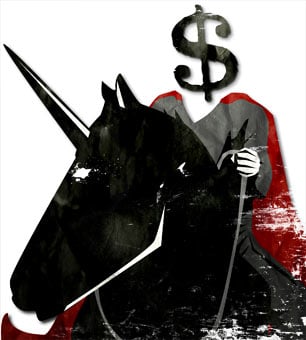As the global economic meltdown drags most of us through its sixth year, one kind of explanation is heard often and from several sides, including the libertarian right. The crisis since 2007, we are told, is not capitalism’s fault or flaw. That is because capitalism is not the system we now have; it is not the systemic problem the world now faces. If only we could “get back to” something like “pure” capitalism, that would dissolve our economic woes.
Policy prescriptions flow smoothly from this explanation. We must end the bad economic system we now have. “Crony,” “gangster,” “casino” and “monopoly” are among the adjectives designating today’s actually existing – impure – capitalism. It fails to achieve all the progress and prosperity that a pure capitalism would deliver. Those who reason in this way then denounce one or another of the demons they believe to have rendered capitalism impure. Those demons – external and antithetical to pure capitalism – include big government, monopolies, the Federal Reserve, welfare, taxation, labor unions, etc. Their intrusions interfere with pure capitalism and block its intrinsic efficiency. They prevent economic justice: how pure capitalism would allocate incomes according to each person’s and each enterprise’s contributions to economic output. Those demonic outside institutions distort economic rewards to favor “special interests.” And so the economy and society suffer.
By celebrating pure capitalism, such arguments can criticize the economic crisis without sounding anticapitalist. They reaffirm their loyalty to capitalism in the abstract even as they attack its concrete here and now. The trick is to identify the present system and its enduring, deep crisis as anything but capitalist.
This is fantasy. Impure capitalism is the only kind we have ever had. For example, government always accompanied capitalism. Government often served a rising capitalist class to undermine, defeat and destroy other classes. In the French Revolution, the rising class of merchants, bankers and small capitalists captured state power and used it to undermine French feudalism. American revolutionaries took over government from Britain and used it to facilitate the growth of capitalism in the United States in countless ways. Those include the wars on native people and the taking of their land; the enabling and often also building of crucial infrastructure (harbors, canals, railways, roadways and airports); the Civil War and its aftermath; the postal system; the judicial system (police and courts to adjudicate disputes); modern public education and so on. Capitalism without government is a fantasy.
Likewise, monopolies have always been with capitalism. Each enterprise constantly fears and seeks to block or undermine monopolies within industries from which it must buy inputs. Each enterprise likewise seeks opportunities to organize monopolies for what it sells. The profit motive prompts both behaviors. Competition thus leads to monopoly and vice-versa. Capitalism always displays monopolies being erected (competition eroded) and monopolies being dissolved (competition strengthened). A pure capitalism without any monopolies is another fantasy.
The Federal Reserve replaced alternative monetary institutions when and because the latter proved unacceptable for capitalists (among others). Money and credit and their roles within capitalism evolved together with institutions to control or manage them. Every modern capitalist economy has developed a central bank with functions comparable to those of the Federal Reserve. All such central banks serve as well as depend on the larger capitalist economy. Developed or modern capitalism without a central monetary authority is a fantasy.
Capitalism’s profit-driven automation and its recurrent business cycles often yielded more workers than there were available jobs. Especially when prolonged and large, unemployment generated suffering, anger and eventually rebellion. Capitalism’s automation and instability, separately or combined, always risked provoking threats to its survival. To limit such threats by easing the suffering, capitalism developed various modes of charity and welfare for the unemployed. Welfare systems are not external intrusions upon, but rather self-protective outgrowths of, and within, capitalism’s actual functioning. Full employment has been extremely rare in capitalism’s history; unemployment was and is the norm. Debates over how much and whose wealth will be diverted to support the unemployed via welfare systems have always agitated capitalism. However, to imagine a pure capitalism without one or another kind of welfare is delusion.
Finally, capitalism’s recurring tendencies toward greater inequality of income and wealth have always and everywhere lead to social mechanisms of redistribution. Taxation has been such a mechanism since it almost always functions as more than a means to raise money for government activities. Shifting between more progressive and more regressive tax structures and their enforcement redistributes income and/or wealth as social conditions shift and political tensions permit. Incomes and wealth get redistributed among capitalists and between them and the rest of the population. A pure capitalism without a tax system that redistributes income and wealth is imaginary.
Labor unions too are products of capitalism. Workers’ problems in capitalist economies have almost universally provoked them to try to form unions. They are not some external institution intruding upon some pure capitalism. Capitalists have always struggled to prevent, destroy or weaken them. They have never fully succeeded. A pure capitalism without unions is purely wishful thinking.
Yet such fantasies, delusions and imaginary scenarios serve ideologically. Beliefs in the possibility and desirability of a “return to pure capitalism” divert people from considering or supporting social change going forward beyond capitalism. Instead they work to reduce or destroy government, monopolies, the Federal Reserve, tax systems (and agencies like the Internal Revenue Service), welfare and unions. Even when libertarians and others partially achieved such goals, they never thereby solved capitalism’s problems. The capitalism that generated those institutions always responded to their partial destruction by regenerating them or variations of them.
The economic crisis and decline most of us are now living through will not be overcome by fantasies of return to some golden age of pure capitalism. We need to push forward, to do better than actually existing capitalism. For the first time in a long time, we can now ally with the fast-growing number of people reaching that same conclusion.
